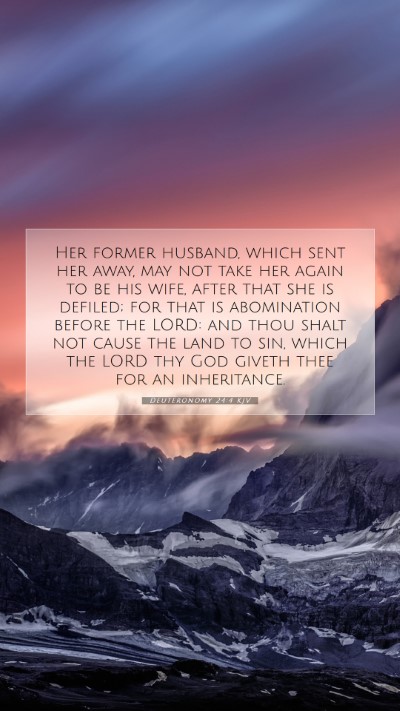Bible Verse Commentary: Deuteronomy 24:4
Verse Reference: Deuteronomy 24:4
This verse states: "Her former husband which sent her away may not take her again to be his wife, after that she is defiled; for that is abomination before the LORD: and thou shalt not cause the land to sin, which the LORD thy God giveth thee for an inheritance."
Overview of the Verse
The verse addresses the regulations surrounding divorce and remarriage in ancient Israelite society. It emphasizes the seriousness of marital covenants and the consequences of defilement resulting from infidelity. Understanding this scripture is essential for gaining insight into the broader biblical view of marriage, fidelity, and the heart of God's law.
Insights from Public Domain Commentaries
-
Matthew Henry Commentary
Matthew Henry explains that this law prohibits a woman from returning to her first husband if she has been married to another man. This serves to protect the sanctity of marriage and highlights the seriousness that God places on marital commitments. Henry notes that the law indicates the abominable state when a woman, having been defiled, returns to her former husband, suggesting that this destroys the moral fabric of the community.
-
Albert Barnes Commentary
Albert Barnes elaborates on the intention behind the prohibition. He emphasizes that this statute was likely aimed at preventing moral corruption within Israel. Barnes brings attention to the societal implications of such actions on family dynamics and community integrity, suggesting that God's instruction here helps establish boundaries that promote faithfulness and accountability.
-
Adam Clarke Commentary
Adam Clarke provides insight into the cultural context during the time of this decree. He notes that the law reflects God’s desire for order and purity in relationships within the community. Clarke highlights that the prohibition indirectly points to the nature of God's covenant with His people, underscoring the commitment He desires from humanity. Furthermore, he emphasizes the seriousness of the term "defiled" and its implications for relational purity.
Understanding the Meaning
To grasp the meaning of Deuteronomy 24:4, we must appreciate the cultural, historical, and theological underpinnings of the text. This scripture not only addresses divorce but also sets a foundation for understanding the permanence of marital unity in God's eyes. To dive deeper into the bible verse meanings, it involves understanding the emotional, spiritual, and social ramifications of forsaking a marital bond.
Historical Context
The regulation in Deuteronomy 24:4 was made in a time when families and lineage were incredibly significant in Israelite society. Understanding the historical context provides clarity on why such laws were necessary; they served to maintain family integrity and societal order. The harsh realities of marital unfaithfulness would have had deep repercussions that extended beyond individual couples, affecting communal welfare.
Related Cross References
- Matthew 5:31-32
- Malachi 2:16
- 1 Corinthians 7:10-11
Application in Daily Life
In modern times, the principles found in Deuteronomy 24:4 still resonate as they call for fidelity and commitment in relationships. When exploring the application of Bible verses to daily life, one might reflect on their commitments, ensuring they uphold integrity and honor the relationships they cherish.
Conclusion
Deuteronomy 24:4 teaches profound lessons about the seriousness of vows and the sanctity of marriage. Through careful scripture analysis and understanding of this text, followers gain bible study insights that can be applied to their lives today, promoting healthy and faithful relationships.


